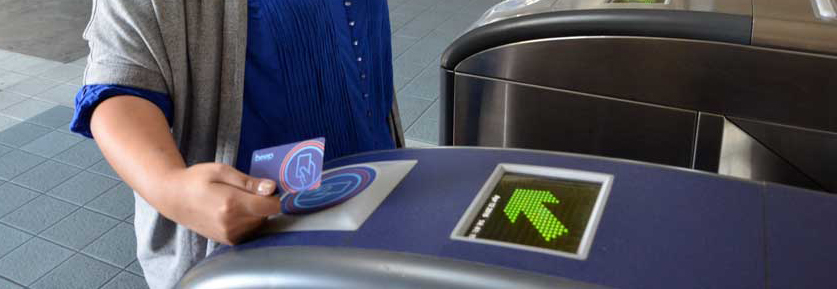
NITC is soliciting proposals for the pooled fund project:
Applying an Equity Lens to Automated Payment Solutions for Public Transportation
Abstracts due September 30th; Proposals due October 19th
Our Pooled Fund program offers a process by which cities, counties, MPOs and other regional or local agencies can pool relatively small pots of research dollars to then leverage NITC matched funds for a single, collaborative project. Research statements were solicited from partner agencies in Spring 2018, and the project outlined below was selected by the NITC Executive Committee to move forward for funding.
ELIGIBILITY
Faculty members and research faculty eligible to serve as Principal Investigators (PIs) at Portland State University, Oregon Institute of Technology, University of Arizona, University of Oregon, University of Utah, or University of Texas at Arlington may submit proposals.
GRANT TIMELINE
PROJECT SCOPE
Transit agencies are modernizing their fare collection systems in an effort to reduce the expense of collecting cash and increase operating efficiency. Reducing cash in the transit system not only lowers costs to maintain and operate the system, but also provides an opportunity to collect enhanced ridership data to optimize routes and better serve the community. As technology continues to innovate mobility, the ability to connect customers across multiple modes with an automated fare payment solution has become a hallmark for many public agencies. Yet, the equity implications for people who may be excluded or greatly inconvenienced by paying for transit through non-cash based collection technologies are not well understood.
What are the perceived and realized outcomes of equity solutions employed by public agencies to address automated payment technologies? How does the automated payment systems impact customers that live or work in transit deficient areas; the underbanked and unbanked customers; riders that do not own smartphones or have readily available internet access; and other customers that are potentially excluded from these automated payment solutions? How are agencies addressing these issues and how effective are these solutions?
The results of this research will provide a framework to answer these questions, and will be used by public transportation agencies, mobility service providers, advocacy groups, and technology providers/vendors to develop and implement equitable solutions that provide the best possible impact to the community they serve.
PROJECT PARTNERS
This national study brings together cities and local jurisdictions in providing financial support for the project. These include:
- City of Gresham, OR
- City of Eugene, OR
- Denver RTD, CO
- Lane Transit, OR
- moovel NA
Additional partners will share data from ongoing or near-term rider intercept studies. These include:
- LAMetro, CA (rider intercept study for MOD)
- TriMet, OR (rider intercept study)
- WMATA, DC (rider intercept study for evaluation of cashless pilot)
A subset of these partners will serve on the project Technical Advisory Committee (TAC). The TAC will provide project insight and feedback and will be responsible for reviewing any products, deliverables, and reports produced during the project.
AWARD EXPECTATIONS
Matching funds are provided by the project partners. Should the budget exceed $150,000, the proposer will be expected to find additional cash match for funds requested from NITC.
PROPOSAL EVALUATION CRITERIA
All proposals will be reviewed by the TAC. The TAC will evaluate and rank the proposals using the criteria below and will convene to discuss the merits of each proposal:
- the proposer’s demonstrated understanding of the problem;
- the merit of the proposed research approach and methodology; and
- experience and qualifications of the proposers.
FORMS AND DOCUMENTS
- Pooled Fund RFP (Equity/Transit) (posted Sept 2018)
- Pooled Fund Proposal Form (Equity/Transit) (posted Aug 2018)
- Data Management Plan (Guide & Template)
- Pooled Fund Budget Form (posted July 2018)
HOW TO APPLY
Complete the proposal form and the Data Management Plan as a PDF, and the budget form as an Excel spreadsheet (typically 10 - 12 pages in length). Submit your materials online here: http://ppms.trec.pdx.edu/ (closes at 5 PM PDT on October 19, 2018). Please select grant cycle "NITC Pooled Fund Round 3."
This NITC grant is part of the University Transportation Center program, funded by the U.S. Department of Transportation, and is a partnership between Portland State University (PSU), the Oregon Institute of Technology (Oregon Tech), University of Arizona (UA), University of Oregon (UO), University of Utah (UU), and University of Texas at Arlington (UTA).
